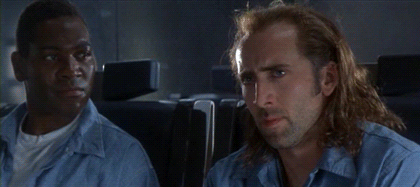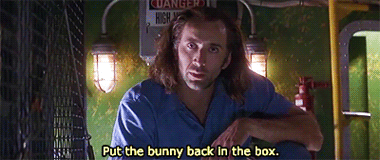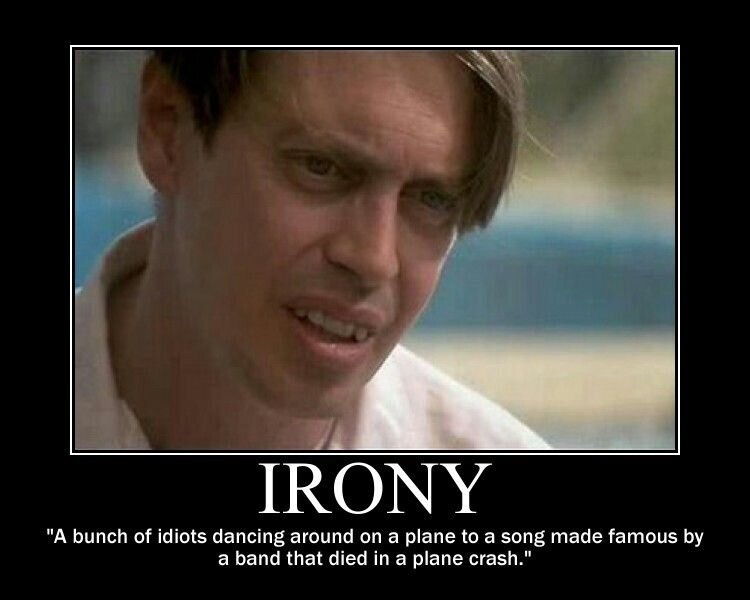The Travolta/Cage Project #48: Con Air (1997)
When I dreamed up Travolta/Cage and the Travolta/Cage Project I had no idea what I was in for. I just knew that I would be going on a long journey with a friend and hopefully a loyal cadre of listeners through the lives and careers of two of our most endlessly fascinating icons.
I had no idea just how much joy I would derive from these movies and these memories. Because that’s what this series is really all about: movies and memories and the powerful emotional and spiritual bond that exists between an actor and his fans.
It’s been a wild and wonderful ride. It’s tough to beat Travolta’s 1976 to 1981 run, which entailed Carrie, The Boy in the Plastic Bubble, Saturday Night Fever, Grease, Blow Out and Urban Cowboy, or Cage’s late 1980s, when, in a two year span, he made Raising Arizona, Moonstruck and Vampire’s Kiss.
But we are in a wonderful groove here with Cage, whose riotous right turn into being a jacked-up action superstar following his Oscar-winning turn in Leaving Las Vegas represented one of 1i990s weirdest and most unexpectedly awesome surprises.
The 1990 Top Gun knockoff Fire Birds served as a shaky, ultimately unsuccessful test run for the mid-1990s blockbusters that would make Cage a muscle head action icon but it made the fatal mistake of trying to make Cage into Tom Cruise instead of utilizing the qualities that make him unique, extraordinary and, I’m just going to say it here, perfect.
That’s right, I’m making the claim here that Nicolas Cage is perfect, albeit in a manner rife with imperfections. The Rock wisely cast America’s favorite eccentric as a man of action, sure, but also a genius-level science brain, huge nerd and unrepentant oddball.
Con Air makes similarly inspirited use of Cage’s unique skill set, albeit in a much different way. In a scuzzy realm of low-lives, killers, rapists, child molesters and various other bad dudes, Cage’s Cameron Poe is an overgrown Boy Scout, a doting dad and loving husband who ended up in the clink while nobly defending his pregnant wife and lives only for the day when he can be reunited with his soulmate and meet his daughter.
Cage begins the movie in uniform but he does not truly become Cameron Poe until he goes to prison and we see his dramatic physical metamorphosis into an absolute beast of a man thanks to a prison schedule that offers all the time in the world for exercise.
The unfairly convicted father and husband gets jacked to an Incredible Hulk extent from all those upside-down push-ups. His hair grows as aggressively as his muscles. Soon he’s sporting a look that can best be described as “Trailer Park Jesus”, “Hillbilly Samson” or “Redneck Fabio.”
Prison can’t corrupt or taint this righteous man. If anything, it only strengthens his resolve to do the right thing. In Con Air Cage emerges as a gentle giant, a brute with a tender soul whose hands are capable of both beating a man to death in a murderous rage and doing advanced origami.
Con Air’s most iconic moment has been commemorated on countless memes and gifs. It’s the look of pure exhilaration on Cage’s face as he steps out of a prison bus and feels the purifying, sacred sunshine on his face and drinks in the sweet, sweet non-prison air, air that smells like mom, the flag, apple pie and freedom.
Even if you have not seen Con Air you’re probably familiar with this image. It’s become ubiquitous online shorthand for feeling not just good but ecstatic for a very good reason: it epitomizes pure, delirious joy as powerfully and purely as the equally famous meme of Cage at his delirious worst in Vampire’s Kiss captures insanity. At its best, Con Air captures that sense of child-like joy in mayhem and destruction, in things going kablooie and the worst men alive running amok in Las Vegas, the wickedest and consequently most American city on God’s green earth, and a destination Cage couldn’t resist in the 1990s.
Cage made three of his signature films in Sin City in the 1990s. They each showcased decidedly different sides of Cage’s extraordinary talent. Andrew Bergman’s rightfully beloved Honeymoon in Vegas established that Cage could be a wonderful, charming and offbeat mainstream romantic leading man if he desired that kind of a career. Cage’s Oscar-winning turn in Leaving Las Vegas, meanwhile, highlighted the hardcore thespian side of Cage’s multi-faceted persona, the ragingly ambitious actor who took huge risks and was eager to suffer for his art while Con Air is a gloriously trashy product of Cage’s shockingly entertaining and successful evolution into a macho action hero.
Cage contains multitudes. He is a man of many moods and faces, not to mention accents and hairstyles, many of them exceedingly, even excessively colorful.
After years of good behavior, Cameron is paroled. Unfortunately the plane that will be transporting this good man home is populated by the absolute scum of the earth, notorious criminals whose crimes are the stuff of legends, documentaries and true crime podcasts.
There’s Cyrus "The Virus" Grissom (John Malkovich), a riot-starter, Hannibal Lecter-style effete snob and someone who likes to brag about killing more people than Cancer. He’s abetted by Nathan “Diamond Dog” Jones (Ving Rames), who once upon a time was a big shot with a Black Panthers-style Black Power organization but seems fully committed to criminality at this point in his life and career.
Don’t you think? It’s like RAIN on your wedding day! Some GOOD ADVICE that you just didn’t take!
A young Dave Chappelle makes an indelible impression as Pinball Parker, a string bean of a convict with a gift for machine gun patter and live-wire ad-libs who unfortunately does not survive to see the second half of the film.
Most problematically there’s Steve Buscemi’s Garland Greene, the notorious “Marietta Mangler”, a fiend whose crimes we’re told make the Manson Family look like the Partridge Family. Even this murderer’s row of legit murderers fears Garland and his propensity for twisted violence.
It’s implied that Garland is a child molester as well, something that is played for laughs dark and tasteless and deeply uncomfortable laughs, the kind that get stuck in the throat. Cage may be Con Air’s diamond-hard moral core, a man whose compass always points in the right direction, but there’s a streak of pure, mean-spirited nihilism embodied by the film’s winking treatment of Garland as a horrific monster with blood on his hands but also a likable, wisecracking, philosophical goof if you catch him in the right mood.
They probably would have! Thank God that didn’t happen!
In a deafeningly loud action extravaganza, Buscemi unexpectedly but compellingly underplays the role of a Jeff Dahmer-like serial killer who once wore a girl’s head as a hat. Garland does not raise his voice. He doesn’t need to. He commands fear and respect just by virtue of who he is and what he’s done.
In that respect, Buscemi might just have done too good of a job. His performance is so magnetic that it’s impossible to ignore it or its ragingly problematic elements. Speaking of problematic, the great Danny Trejo is regrettably typecast here as a figure out of Donald Trump’s nightmares, a rapist who brags that while he’s known as Johnny 23 thanks to the number of women he’s raped, but if the authorities knew the full truth they’d call him Johnny 600. Rounding out the stereotype brigade is a cross-dress convict who shows up very briefly in spots for comic relief.
When the convicts, led by scheming Cyrus the Virus, take over the plane just when our hero is about to know freedom it falls upon Cameron to battle an entire plane full of hardened criminals with unusual, impressive and extensive skill sets when it comes to death and destruction and ensure that his diabetic buddy Mike "Baby-O" O’Dell (Mykelti Williamson) gets the insulin shot he needs before he dies.
John Cusack costars as Vince Larkin, a US Marshall who believes that prisoners are human beings with rights and innate dignity and is consequently treated like a New Age Communist radical who wants to go a kissing date with every criminal he meets by his colleagues.
When the plane crash lands on the Vegas strip, Vince and Cameron join forces to keep the prisoners from escaping and unleashing an unholy crime wave the likes of which Las Vegas has never seen, and that’s saying something, since Las Vegas has a rather lax attitude towards crime, as evidenced by its controversial “Go ahead and do crimes here. We won’t snitch!” Ad campaign.
I have vague, distant memories of being not just disappointed but faintly disgusted by Con Air the first time around. It offended me morally as well as aesthetically, particularly regarding its treatment of Buscemi’s character. I am pleased to report, however, that in the ensuing twenty-three years I have loosened the fuck up and am now able to appreciate Con Air for what it is: enjoyable trash, a sleazy delight positively vibrating with pulpy, vulgar enemy.
The difference is Cage, of course. When the antagonists are pretty much ALL THE BAD GUYS IN THE WORLD, a bevy of colorful badasses played by legendary tough guy characters and talented newcomers like Chappelle you need a hero with the raw power and magnetism of a 1997-era Nicolas Cage, not to mention that glorious mane of hair.
Con Air is trash but it is exuberant trash, colorful trash, trash with personality and pizzazz. Cage would eventually run the whole action hero thing into the ground with an endless series of interchangeable direct-to-video movies where he played cops or crooks but at its glorious, endlessly celebrated beginning, when he banged out The Rock, Con Air and Face/Off in quick succession, indelibly establishing that the recent Oscar-winner and heavyweight thespian could more than hold his own in a giant action behemoth, it was a goddamn sight to behold, eminently worthy of being celebrated and endlessly, joyously revisited.
Help ensure a future for the Happy Place during an uncertain era AND get sweet merch by pledging to the site’s Patreon account at https://www.patreon.com/nathanrabinshappyplace
Also, BUY the RIDICULOUSLY SELF-INDULGENT, ILL-ADVISED VANITY EDITION of THE WEIRD ACCORDION TO AL, the Happy Place’s first book. This 500 page extended edition features an introduction from Al himself (who I co-wrote 2012’s Weird Al: The Book with), who also copy-edited and fact-checked, as well as over 80 illustrations from Felipe Sobreiro on entries covering every facet of Al’s career, including his complete discography, The Compleat Al, UHF, the 2018 tour that gives the book its subtitle and EVERY episode of The Weird Al Show and Al’s season as the band-leader on Comedy Bang! Bang!
Only 23 dollars signed, tax and shipping included, at the https://www.nathanrabin.com/shop or for more, unsigned, from Amazon here








